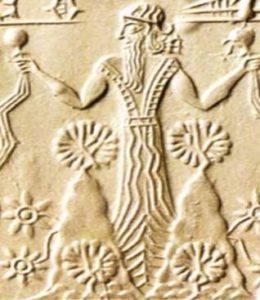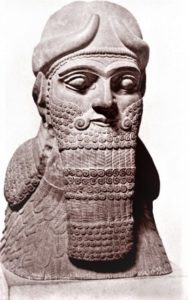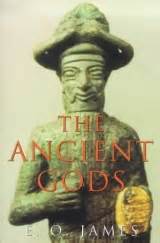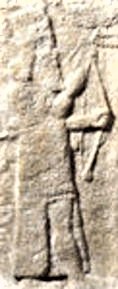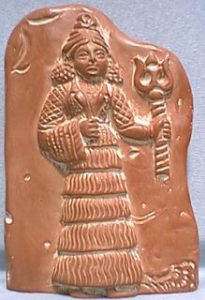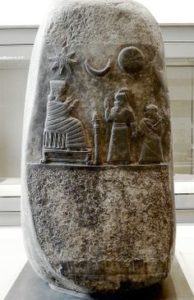(Texts: All Artifacts, Color Coding, & Writings in Bold Type With Italics Inside Parenthesis, are Added by Editor R. Brown, not the Authors, Translators, or Publishers!)
(gods in blue … mixed-breed demigods in teal)
(1001):
[…] … […] … the sun […] heart [was ang]ry […] … [… …] … […]
I raised and […] Imgur-Enlil … […] … […] … a wall a king
[… to be as secure as a great] mountain [for far-off days].
[…] oath […] … to […] he placed and […] the people.
He built their … […] and […] over […
(As for) E]durgina, the dwelling of the god [Bēl-ṣarbi that is in]side of Baṣ,
he took its […] and bui[lt] (it) anew.
[The gods Bēl]-ṣarbi, Nabû and [Marduk, (and) Ni]nsaggirgi (unidentified) and Dumu[zi,
(all sons & grandsons of Enki) the god]s living in [it], they raised up their […].
[The gods Ea (Enki) and] Asalluḫi (Ashur), by the[ir exalted] wisdom,
(1002):
to be as secure as [a great moun]tain [for] far-off [days. …] cast [bro]nze […]
he oversaw its [sm]elting and examined […
He built from its foundations t]o its parapets, [… all] of its copings […] … […] Cutha,
The gods Ea (Enki) and Asalluḫi (Ashur), by their exalted wisdom,
opened their mouth(s) with “the washing of the mouth” (and) “the opening of the mouth” (rites)
and had (them) dwell on their pure pedestal(s) in their lofty cellas for all ti[me].
The one who expanded the cult cent[ers], enlarged the temples of the [great] gods,
which from ancient times […] … […]
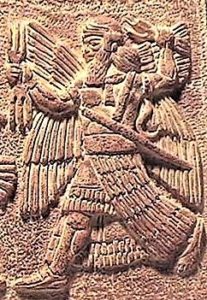 (Marduk with alien weaponry)
(Marduk with alien weaponry)
Through their go[od] deeds, [may] the god Marduk, [the great god, my lord, …]
the foundation of [their royal] thr[one …] … […]
(1003):
… […] the one who distributes [shares] to the … people, […], the one who opens canals,
(and) the one who makes the pasturage (and) watering places flourish;
whose countenance is excellent, the awe-inspiring god, the bearer of the furious mace,
the one who conquered the enemy, overthrew e[vil], … […]
[…] …, anci[ent] stock, sublime ruler, governor of Babylon, tr[ue] prince,
the one to whom the god En[lil] has stretched out his hand, rever[ent] servant,
(No translation possible)
[May] one of the kings, [my] descendants, [who] comes forth to rule the land,
[read an inscripti]on written in my name when this [temple] becomes old
and when he renovates its [dilapid]ated section(s), [and] may he anoint (it) with oil,
make an offering, write [my name w]ith his name, (and) return (it) [to] its [place.
May he respect] (my) inscrip[tions …]
(1004):
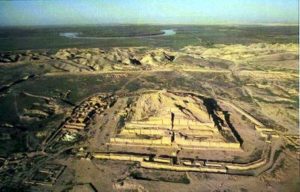
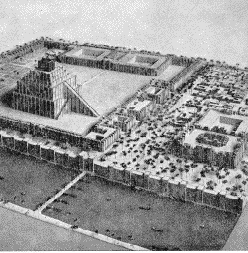 (Marduk’s ziggurat residence Esagil)
(Marduk’s ziggurat residence Esagil)
[… ki]ng … […] I sett[led …] in a peaceful dwelling […] … mountain, my lord … […] …
that road, property of/that … […] … of Esagil and Babylon […]
[…] … I brought them in […] … […] … [my] gifts […] he received […] …
(and) he [… i]n the land they made […] disappear […].
(No translation possible)
(1010):
[… the] scattered [people] of Uruk, who caused to re[turn …].
At that time, the scattered herds of the goddesses Ištar and [Nanāya (…)],
those scared away from their watering place and [having no] caretaker [(…)]
I gathered, and 60,000 sheep and goats together with […], 6,000 cows together with [their] herdsm[en (…)],
a present of my grandfather Sargo[n (II) …] which he/they had scattered with the herds,
I brought back to [their] pla[ces (…)].
The sons of Samiku, the sons of […, the sons of] Bēl–rammēni, the sons of […, the sons of] …,
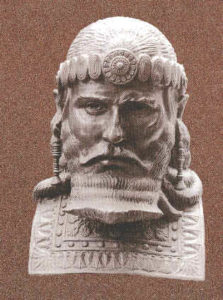 (Assyrian King Esarhaddon)
(Assyrian King Esarhaddon)
and me, [Esarhaddon, (…)] … and [I inscribed (their freedom) on] a tablet.
[…] in the presence of the goddess Iš[tar …] and the scattered herds to […] in all lands
[…] … […] I established [their] pri[vileged status (…)].
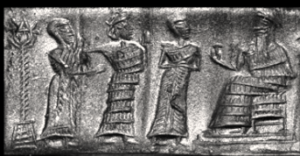 (Inanna brings king before father Nannar)
(Inanna brings king before father Nannar)
On account of this, [may] the goddess [Ištar, (…) look upon] my [good] deeds [with pleasure and …]
[…] like my very name, the king who builds Eanna, the one who was chosen [by the god/goddess …]
